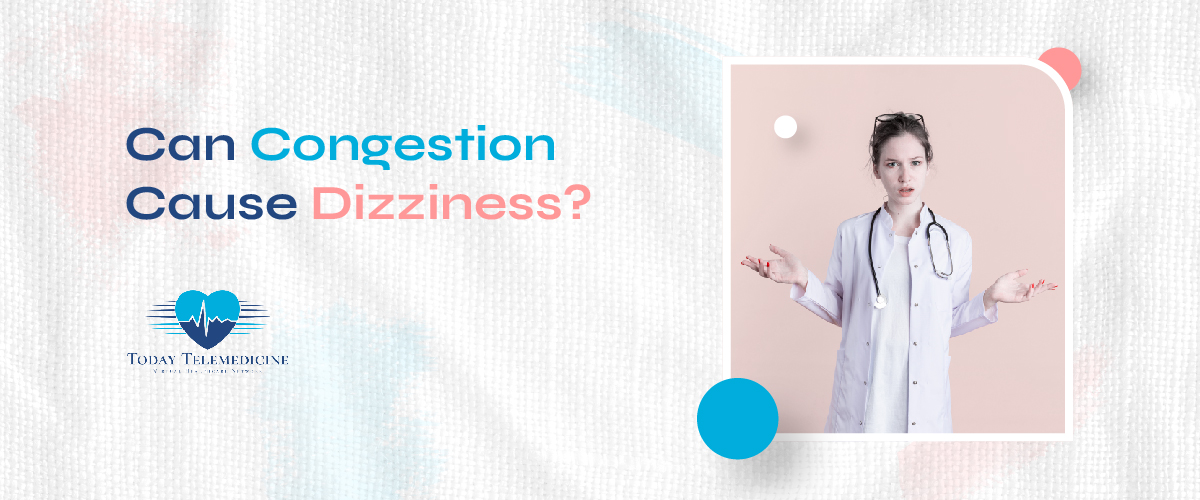Have you ever felt dizzy caused by congestion? It could be from a stuffy nose, allergies, or sinus infection.
Understanding the link between congestion and lightheadedness is important for managing these symptoms.
Congestion can make even simple tasks feel challenging, and many of us are familiar with this uncomfortable sensation.
Sarah Purdy, PA-C, at Today Telemedicine, is available to treat your congestion issues urgently. For more information, please contact us.
Now, let’s discuss dizziness with congestion and examine the question, can congestion cause dizziness?
How Many Types of Congestion in Medical?
There are several types of congestion commonly recognized:
- Sinus Congestion
It is also known as sinusitis or nasal congestion, refers to the inflammation and swelling of the tissues lining the sinuses.
Your sinuses are empty spaces in your head near your nose. They can get blocked or inflamed and swell up.
- Chest Congestion
When mucus builds up in your lungs and bronchial tubes, often due to infections like bronchitis or pneumonia, or conditions like asthma.
- Venous Congestion
When blood does not flow well in your veins, causing blood to gather. It is common in legs and feet, leading to swelling and discomfort.
- Ear Congestion
Feeling like your ears are full or under pressure because of blockage or inflammation in the Eustachian tube. It is linked to ear infections or changes in air pressure, like during flights.
- Vascular Congestion
When there is too much blood in an organ or tissue because blood flow or control is not working right. It is often seen in conditions like liver problems.
Understanding the Connection Congestion and Dizziness
The connection between congestion and dizziness can sometimes be related in a few ways.
It refers to issues like feeling pressure or blockage in your ears or sinuses, which can affect balance and cause dizziness.
When your ears are congested, it can throw off your sense of balance because your inner ear helps control that.
Dizziness can also come from other reasons, like low blood pressure or dehydration.
If you are feeling dizzy often, it is a good idea to check with a doctor to see what’s causing it
Can Congestion Cause Dizziness?
Can sinuses cause dizziness? Yes, indeed! It may surprise many to realize how sinuses cause symptoms of a sinus infection and dizziness.
Our bodies are complex and interlinked systems. So, an issue in one part can impact another. It explains why symptoms of a sinus infection dizziness can occur.
Let’s consider chronic sinusitis. Here, recurring infections are constant. This condition troubles countless people, causing discomfort and pain.
When sinuses get swollen, they may press on face parts close by, like our ears. Our ears are vital for balance. Any interference can cause a sense of instability or vertigo.
Let’s discuss some other questions related to the cause of dizziness or vertigo, so please continue reading..
Can Coughing Cause Vertigo?
Yes, coughing can sometimes cause vertigo. When you cough forcefully, it can temporarily disturb the balance organs in your inner ear.
These organs help you keep your balance, and any sudden changes in pressure or fluid can make you feel dizzy or like things are spinning around you.
It is more likely to happen if you already have problems with your inner ear.
If you feel dizzy after coughing, it is a good idea to talk to a doctor to make sure everything is okay and to get help managing the symptoms.
Can Blocked Nose Cause Dizziness?
Yes, a blocked nose can cause dizziness. Breathing less effectively can reduce the amount of oxygen your body receives.
Low oxygen levels or changes in blood flow can make you feel dizzy. Additionally, congestion can affect your inner ear, which controls balance, leading to dizziness.
Managing Congestion-Related Dizziness
If you experience dizziness due to congestion, try the following tips to feel better:
- Stay Hydrated: Drinking plenty of fluids can thin mucus and relieve congestion.
- Use Steam: Inhale steam from a hot water bowl or take a steamy shower to loosen congestion and alleviate sinus pressure.
- Rest: Resting allows your body to heal from congestion and any related symptoms.
Medical Treatment
If your dizziness is severe or persistent, seek medical attention.
Our specialized physicians at Today Telemedicine can guide you toward appropriate treatment.
It may include antibiotics, like decongestants, or antihistamines to relieve congestion.
Nasal sprays or treatment for sinus dizziness can also reduce inflammation and pressure.
Conclusion
So, can congestion cause dizziness? Yes, it can.
Congestion can make you feel dizzy because it affects your sinuses, inner ears, and balance.
This dizziness is usually mild and temporary, but it is important to monitor your symptoms. If they do not improve or worsen, consult a doctor.
Reducing your congestion can often help ease dizziness and improve your overall well-being.
At Today Telemedicine, we are here to assist with urgent health issues such as respiratory problems.
We also provide reliable health advice and assurance. Contact us for further details about our services.
FAQs
Does sinus cause dizziness?
Problems with your sinuses, including a sinus infection, can make you feel dizzy. It happens because swelling and blockage can impact your inner ear and balance.
So, can a sinus infection make you feel dizzy? Yes, it can.
Can head congestion cause dizziness?
Yes, head congestion can cause a sense of unsteadiness by disrupting inner ear balance and increasing sinus pressure.
Can a sinus infection cause dizziness and shortness of breath?
Yes, a sinus infection can lead to both dizziness and breathing difficulties.





